| Srl | Item |
| 1 |
ID:
132887
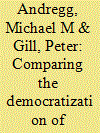

|
|
|
|
|
| Publication |
2014.
|
| Summary/Abstract |
This introductory article discusses some of the main themes that are contained within this collection originally delivered as papers to two conferences. There is brief consideration of some issues of method and major themes relating to the legacy of authoritarian regimes, the process of change and the current state of 'democracy' are identified. Continuing controversies and uncertainties around intelligence have important implications for democratic governance in many countries which must encourage more comparative work in this key area of intelligence studies.
|
|
|
|
|
|
|
|
|
|
|
|
|
|
|
|
| 2 |
ID:
159920
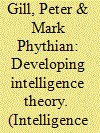

|
|
|
|
|
| Summary/Abstract |
As this special issue of Intelligence and National Security on ‘Developing Intelligence Theory’ is published, it is a decade since its three editors decided to put together an initial volume presenting the current state of conceptual thinking about intelligence. That book, Intelligence Theory: Key Questions and Debates,
|
|
|
|
|
|
|
|
|
|
|
|
|
|
|
|
| 3 |
ID:
079211
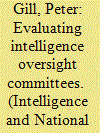

|
|
|
| 4 |
ID:
171250
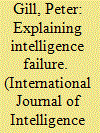

|
|
|
| 5 |
ID:
092460
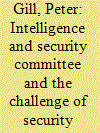

|
|
|
|
|
| Publication |
2009.
|
| Summary/Abstract |
A major feature of current security is the development of intelligence networks between agencies within and between nations and across public and private sectors. The performance of the UK Intelligence and Security Committee (ISC) is examined within this context, especially regarding allegations of collusion by UK agencies in rendition and torture. Proposed changes to the ISC are discussed and it is argued that the ISC must seek to leverage its limited powers by helping to construct an oversight network.
|
|
|
|
|
|
|
|
|
|
|
|
|
|
|
|
| 6 |
ID:
072401


|
|
|
|
|
| Publication |
Cambridge, Polity Press, 2006.
|
| Description |
xvi, 228p.
|
| Standard Number |
0745632459
|
|
|
|
|
|
|
|
|
|
|
|
Copies: C:1/I:0,R:0,Q:0
Circulation
| Accession# | Call# | Current Location | Status | Policy | Location |
| 051358 | 327.12/GIL 051358 | Main | On Shelf | General | |
|
|
|
|
| 7 |
ID:
113404
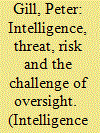

|
|
|
|
|
| Publication |
2012.
|
| Summary/Abstract |
Intelligence studies has traditionally talked in terms of 'threats' though the idea of 'risk' has now entered its language, as it has so many other areas of policy. The key distinction remains the notion of threat of intentional action to cause harm: this is the central preoccupation of intelligence agencies that would not normally consider risks that might arise from, say, the unintended outcomes of accidents or interrupted supplies of resources. Another distinction is that intelligence is normally preoccupied with increasing knowledge in conditions of ignorance or uncertainty, while risk analysis is more likely to be quantifiable. The perception of a 'new terrorism' has led to the importation of the 'precautionary principle' to intelligence with potentially dangerous consequences for democracy. This requires enhanced thinking and practice with respect to the oversight of intelligence activities, especially in developing security networks.
|
|
|
|
|
|
|
|
|
|
|
|
|
|
|
|
| 8 |
ID:
175086
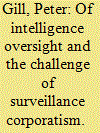

|
|
|
|
|
| Summary/Abstract |
This article examines the experience of oversight during the last fifty years in order to inform current debates in both the older and newer democracies. First, there is a discussion of certain key concepts: intelligence governance including control, authorisation and oversight; second, the difficulties facing oversight, specifically, how these can be alleviated by a structure involving both parliamentary and specialist bodies and, third, the challenges presented by the structures of surveillance corporatism and its reliance on bulk collection. It is concluded that this new intelligence architecture requires a form of decentred regulation of and by state and corporate actors.
|
|
|
|
|
|
|
|
|
|
|
|
|
|
|
|
| 9 |
ID:
000757
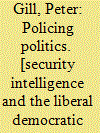

|
|
|
|
|
| Publication |
London, Frank Cass, 1994.
|
| Description |
xx, 365p.
|
| Series |
Cass series: Studies in intelligence
|
| Standard Number |
0714634905
|
|
|
|
|
|
|
|
|
|
|
|
Copies: C:1/I:0,R:0,Q:0
Circulation
| Accession# | Call# | Current Location | Status | Policy | Location |
| 042010 | 327.1241/GIL 042010 | Main | On Shelf | General | |
|
|
|
|
| 10 |
ID:
059934
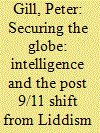

|
|
|
| 11 |
ID:
087538
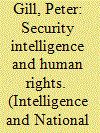

|
|
|
|
|
| Publication |
2009.
|
| Summary/Abstract |
Following some democratization of intelligence in the 1990s, the prosecution of the 'war on terror' since 9/11 has apparently reinforced the incompatibility of secret intelligence and respect for human rights. The primary reason for this is the changed perception of security risks in the context of a 'new' terrorism. The roles of law, rights and ethics in intelligence are discussed with reference to some of the more controversial intelligence activities: informers, interrogation, intelligence sharing, rendition and covert action. Re-invigorated oversight is necessary to protect human rights without hindering agencies' ability to maintain pubic safety.
|
|
|
|
|
|
|
|
|
|
|
|
|
|
|
|
| 12 |
ID:
045997
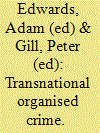

|
|
|
|
|
| Publication |
London, Routledge, 2003.
|
| Description |
xiv, 282p.
|
| Standard Number |
0415300959
|
|
|
|
|
|
|
|
|
|
|
|
Copies: C:1/I:0,R:0,Q:0
Circulation
| Accession# | Call# | Current Location | Status | Policy | Location |
| 047002 | 364.135/TRA 047002 | Main | On Shelf | General | |
|
|
|
|
| 13 |
ID:
159930
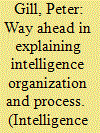

|
|
|
|
|
| Summary/Abstract |
This article considers the state of play with respect to modelling and explaining intelligence. First, there are some brief comments on the issue of theory itself; second, there is a more detailed consideration of the key elements of the information and power processes which constitute ‘intelligence’ and, third, it examines the main variables of regime, strategy and technology that must be considered in explaining the nature of intelligence systems. Finally, some implications for future research are considered
|
|
|
|
|
|
|
|
|
|
|
|
|
|
|
|